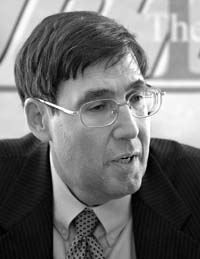In an interview with The Day that was published July 5, 2005, the questioner asked if I agreed with the observation that there was no opposition in Ukraine. When I responded that there was an opposition, as evidenced by both poll data and the troubles the current government was experiencing with its legislation in the Rada, some commentators expressed surprise and searched for political motivation to my comments.
I might add that on occasions when I have hosted members of the current opposition some observers have likewise considered it something out of the ordinary.
I believe that this “surprise” regarding official American contact with the opposition comes from a lingering misunderstanding of the American role here last year, and from a still incomplete understanding of how a democratic culture operates. As for the lingering misunderstanding, during last year’s Presidential elections, the United States had only one interest, ensuring a free and fair election so that the people of Ukraine could choose their own President. We had no preferred candidate in the race and dealt closely and equally with Mr. Yushchenko and Mr. Yanukovych. Of course, there were serious irregularities in the elections, and we pointed that out. We did not do that because we had a favorite candidate. We did it because we thought that it was in our interests for Ukraine to develop as a democracy. For people who believed, out of partisanship or ignorance, that the United States had a favored candidate in last year’s election, it is perhaps surprising to see us in touch with the current opposition. But it should not be so for anyone else.
As any close student of democracy understands, opposing interests and parties are an inevitable, necessary part of an open society. The great founders of the American republic realized that people are not angels. All make mistakes at one time or another and many operate under misconceptions. Some have less than honorable objectives or motivations. Taking this into account, American statesmen designed our constitution as a system of checks and balances that distributed power broadly. We are not advocating the adoption of the specifically American forms of democracy. But any democracy requires mechanisms that make it impossible for any one man or party or faction to monopolize power. An effective opposition is the key to preventing that monopoly.
It is to Ukraine’s great credit that it had such an opposition in the past several years, even when the country seemed to be turning away from the path of democratic development. The strength of the previous opposition, and the insistence by the Ukrainian people that their choice in last year’s election be honored, prevented a stolen election.
The turn towards democracy in Ukraine over the past eight months has led to much closer U.S.-Ukrainian relations. We welcome President Yushchenko’s policies of promoting a free market (though we have not been shy about expressing concerns with specific measures that seem to contradict this) and seeking integration into the international and EuroAtlantic institutions. But all governments, even the most skillful and best- intentioned ones, make mistakes. A government that faces no opposition, a government that controls the media and civil society, has no one to tell it when it is in error. The Yushchenko government has done an excellent job consolidating the media freedoms won during the political crisis last year. But even when the media are free, democratic societies require an active opposition to call the government to account and to offer citizens an alternative set of policies.
Some observers recognize the need for an opposition, but claim that the current parties are somehow not worthy. Charges of corruption or worse are leveled in their direction. We of course offer no justification for criminal behavior — nor do we claim to have evidence permitting us to reach any conclusions. That said, countries, like people, must address the circumstances in which they find themselves. The current opposition parties enjoy significant support from the electorate. New opposition parties, offering alternative programs and ideas, will certainly emerge. There must be a place of respect for them in Ukrainian society. As President Yushchenko pointed out in Donbas on July 15, opposition has an important role to play in Ukraine’s democracy.
When the opposition is respected, politics loses some of its dangerous edge. People in power understand that if they lose an election, their political life and their commercial prospects are not over. So they have less reason to falsify election results because they see a decent future for themselves outside of the government. I know senior Ukrainian figures, who, once removed from office under the previous government, had trouble finding a decent job. Even people who might have wanted to hire them were afraid to do so because they were not sure how the authorities would react. Our hope is that this old pattern will remain where it belongs — in the past.
The leadership of a democracy also learns that when it is able to work with the opposition, it is easier to move its agenda through parliament. We may have seen a bit of this during the passage of some WTO-related legislation earlier this month. It will be a wonderful day for Ukraine when it can be taken for granted that senior politicians can cross partisan lines to do the business of the country.







